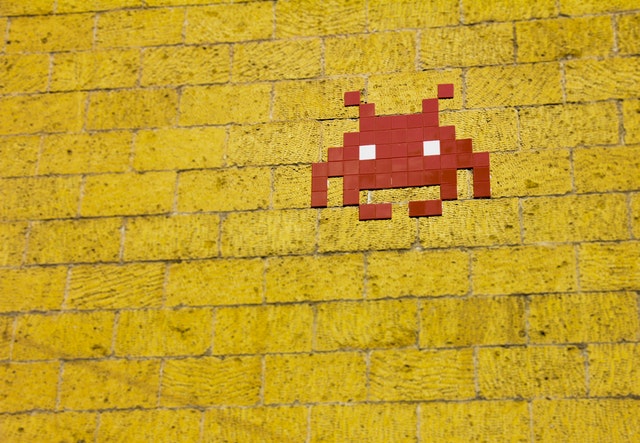The Big Question - What jobs are important for pre-production?
Many aspiring games developers begin by jumping directly from an idea in to creating a game.
However once you’re running a studio as a business, the bridge between concept and production becomes a serious business to avoid wasting valuable development time. There are many broad questions to ask up front:- Who’s the game for? What’s the central gameplay mechanic? What’re your timelines? What’re the pillars of our game? What’s the budget? The more ambitious the game and the larger the team involved, the more there is at stake when linking the path from concept to creation. We asked studios, what jobs are important during this phase?
A gathering of minds
Jo Wilkinson, Producer at Flipbook animation studio in Manchester answers:-
“In a nutshell, all of them! We like to get a range of people involved at pre-production stage, across the board - account handlers, producers, modellers, animators, concept and technical artists. Pre-production is when ideas are brainstormed, drawn up and realised. Those early ideas can come from anywhere and anyone! It's also at this stage we develop which routes we might take and where individual strengths can be utilised, whilst developing schedules and workflows. Involving all parties at this early stage drives the creative, develops ideas and processes, and also ensures going into the production stage that all parties and team members have a clear understanding and vision moving into production, which is key to the project’s success.”
Who does what?
Jonathan Amor is Operations Director of BAFTA-winning, independent game developer Supermassive Games. He gave us am insight in to who does what during pre-production at their studios in Guildford:-
- Designer – creating a high-level game design, proving out key elements of the gameplay, writing the narrative
- Concept Artist – creating concept art for locations, objects and characters, both for reference and to define the look of the game
- Production Designer – specifying the locations, mapping out the environments and gathering reference to define the setting and time period of the game
- Programmer – prototyping key gameplay systems, creating tools and systems for use in production
- Audio Designer – creating audio mock ups to set the style and audio quality bar, selecting and commissioning music
- Producer – creating the plan for production based on learnings from pre-production, and making sure everything is on track to hit important milestones like first playable
Fail to prepare, prepare to fail
James Dobrowski Studio Head at CCP London explains why this phase is so important:- Pre-production is one of the most critical phases of product development, and failing to do it properly will result in an over-budget, late, or subpar game. By the end of pre-production you want a solid understanding of your games vision (it’s design, art style, technical architecture, etc.), the production pipeline in place, a full game-roadmap with an understanding of outstanding risks and unknowns, and as much of the team on-board as possible.
To get to this place, you ideally need to have as much of the team in-place as possible to support the planning and preparation process, with the lead of each discipline – production, engineering, art, design, audio and QA – on the team from the get-go to drive things forward in each area. By the time you move into production you want the team aligned and fully bought into the vision and the plan”.
The Team as a collective
Several jobs coming together for pre-production doesn’t imply any blurring of roles however. Artist, Designers, Coders etc will continue to uphold their specialism but bring their input;- “it’s impossible to do it properly without the right specialists in each area driving the decision making process” Dobrowski told us.
Andreas Firnig is CEO of Nosebleed Interactive and is currently putting the finishing touches to Vostok Inc. due for release later in the year. He told us “rather than a particular job role being more important than another, I think the team really being able to effectively communicate as a single entity, and get to the point where everyone has a shared vision for the project is the most important skill to have for pre-production. It means that everyone has buy in and ownership of the product, and it makes steering the project much simpler. It also allows the team as a whole to know where each member’s strength lies and how best to utilise those strengths”.
Staying agile
One challenge is to ensure the creative heartbeat is able to bring life to a great game without new mechanics or features hindering progress. Pre-production is all about mapping these steps however there is a level of agility needed to establish a feedback loop and identify and make any necessary changes. Dobrowski of CCP points out, “Making games, as with any creative endeavour, needs to be agile and the plan will change with time, however a team should have a long-term plan in-place to use as a baseline to support any future decision making – e.g. effect on budget of changing Feature X.” In some ways then the plans generated in the pre-production phase are designed to be broken, but the roadmap is key in a wider sense to sustain the greater vision and keep everyone involved heading in the same end-destination.
Smaller teams
Firnig of Nosebleed points out the importance of having a multi-disciplined individuals, especially within a more compact business; - “Being a small team means that there’s an element of everyone needing to be able to fulfil several roles, which in larger studios might be split across several people or even whole teams. During pre-production in particular, this “Jack of all trades, master of several” has a really positive impact on our projects, with prototyping and getting to a first playable being achieved much faster”. Provided all the key dependencies in each discipline are covered, there is some fluidity possible across who does what role, provided your team have the skills to wear different ‘hats’.
Service providers
For outsource studios providing services to developers, the pre-production process forms a key phase in ensuring a shared vision between client and supplier about what’s to be delivered. This isn’t unique to the games industry but is a principle for creative services that utilise the same production lifecycle. Jane Forsyth, Head of Production at Realtime where their mission is to create inspiring animation, cinematics and VFX told us:-
“Representatives from all production departments get involved in preproduction to allow us to work out costs and schedules and plan the most efficient way to work through projects – this proves for a smoother process in the long run.
If required, we use our creatives to write and develop treatments with our clients. Once agreed, storyboards or an animatic are produced to visualise the idea – this allows quick feedback for timings and content. Alongside this we develop an art document to discuss and confirm look dev, mood and assets.”
In a nutshell
Liam McGinley is Co-founder of Wibbu Ltd, an educational video-game studio with the goal of modernising foreign-language learning. He told us; “Pre-production is the fun bit! Researching and playing with new tools and tech. Seeing what we can do to push the hardware to squeeze as much performance out as we can. Prototyping parts of the game to find the moment to moment fun. Setting the art style and pipeline”.
All in all the pre-production phase equates to preparing to add in all the ingredients in the right way. As with any good recipe, it is not possible to miss any particular role out without changing the end result. However the flipside of this is that when the balance is right, the end game experience is often truly greater than the sum of it’s parts.
Read more...

Teaser
Amiqus NewsContent Type
News
08/04/2025
Summary
Games mentorship initiative Limit Break has announced the opening of applications for mentors and mentees for its 2025 programme.This will be the seventh year of Limit Break Mentorship, which

by
Liz Prince

Teaser
Amiqus NewsContent Type
Blog
13/03/2025
Summary
The UK slips from 17th to 18th in PwC’s Women in Work Index, down from 10th in 2020 - the steepest post-pandemic decline amongst OECD countries - with Iceland, New Zealand and Luxembour

by
Liz Prince

Teaser
Amiqus NewsContent Type
Blog
06/03/2025
Summary
We’re heading towards International Women’s Day this Saturday (March 8th). This annual global event honours the social, economic and cultural achievements of women, while serving as a call to

by
Liz Prince

Teaser
Case StudyContent Type
News
30/01/2025
Summary
Avid Games, a leading digital card trading game developer, faced critical challenges in expanding its operations and enhancing its strategic capabilities. With ambitions to grow exponentially an

by
Stig Strand

Teaser
Amiqus NewsContent Type
News
18/11/2024
Summary
Empower Up, the online EDI platform from award-winning specialist games recruitment agency Amiqus and #RaiseTheGame – powered by Ukie, is celebrating its first-year anniversary. The

by
Liz Prince

Teaser
Amiqus NewsContent Type
News
07/11/2024
Summary
Some 17 UK businesses, encompassing over 1,000 staff, are taking part in the second four-day week pilot scheme from this week. The trial is once again being led by the 4 Day Week Campaign, whi

by
Liz Prince
.jpg)
Teaser
Amiqus NewsContent Type
News
24/09/2024
Summary
We were delighted to present Harinder Sangha, Co-Founder & COO of Maverick Games with the G Into Gaming accolade at the recent Gamesindustry.biz Best Places To Work Awards. This awa

by
Liz Prince

Teaser
Amiqus NewsContent Type
News
19/07/2024
Summary
I’m in a service profession, one that I’ve been proud to belong to for the past 30 years. For 19 years (so far) of that career, I’ve served the games industry alongside my colleagues at Amiqus

by
Liz Prince

Teaser
Amiqus NewsContent Type
News
01/07/2024
Summary
Develop:Brighton is already upon us, and the Amiqus team is looking forward to once again meeting with friends and peers. We’re also delighted to be involved in the Conference programme – and

by
Liz Prince

Teaser
Amiqus NewsContent Type
News
01/07/2024
Summary
We are delighted, honoured and thankful to have been named Recruitment Agency of the Year at the recent MCV/DEVELOP Awards. The Amiqus team and friends gathered at the Lancaster Hot

by
Liz Prince
Related Jobs
Salary
£25,000 - £30,000
Location:
Guildford (Hybrid)
Specialisms
QA Analyst
QA Tester
Location
South East
Job type
Permanent
Salary
£20 - 30,000
Description
This is a fantastic new opportunity to work with a team who are creating amazing games
Reference
9185
Expiry Date
01/01/0001

Author
Will Hudson
Author
Will HudsonSalary
£55,000 - £78,000 + Bonus
Location:
Midlands or Remote
Specialisms
Back-end Developer
Build Programmer
Programmer
Server Programmer
Location
Europe
Remote working
Midlands
Job type
Permanent
Salary
£60 - 70,000
£70 - 80,000
£80 - 90,000
Description
This is a fantastic opportunity to work for a studio who are creating amazing titles
Reference
9292
Expiry Date
01/01/0001

Author
Will Hudson
Author
Will HudsonSalary
£60,000 - £65,000
Location:
Bucharest or Remote
Specialisms
Back-end Developer
Programmer
Server Programmer
Dev Ops
Location
Europe
Remote working
Job type
Permanent
Salary
£40 - 50,000
£60 - 70,000
Description
This is fantastic opportunity to work with a studio who are developing a range of new titles
Reference
9377
Expiry Date
01/01/0001

Author
Will Hudson
Author
Will HudsonSalary
45-65k DOE
Location:
Remote
Specialisms
Producer
Production
Project Manager
Location
Remote working
Job type
Permanent
Salary
£30 - 40,000
£60 - 70,000
Description
Brand New Exclusive role to Amiqus
Reference
9379
Expiry Date
01/01/0001

Author
Stig Strand
Author
Stig StrandSalary
to £90k plus benefits
Location:
Guildford (Hybrid)
Specialisms
Core Tech Programmer
Engine Programmer
Lead Programmer
Location
South East
Job type
Permanent
Salary
£70 - 80,000
£80 - 90,000
Description
Principal Programmer C++ UE4/5 to lead the development of this studio's open world multiplayer game creation framework. Guildford based, hybrid (2 days in), salary to £90k.
Reference
9373
Expiry Date
01/01/0001

Author
Simon Pittam
Author
Simon PittamSalary
55-75k DOE + Share options and Bens
Location:
Remote
Specialisms
Mobile Game Designer
Monetisation
Location
Remote working
Job type
Permanent
Salary
£30 - 40,000
£60 - 70,000
Description
Brand new Exclusive Senior Mobile Designer role now open
Reference
9348
Expiry Date
01/01/0001

Author
Stig Strand
Author
Stig StrandSalary
to £80k plus benefits
Location:
Leamington Spa OR Remote
Specialisms
Back-end Developer
Dev Ops
Location
UK
Job type
Permanent
Salary
£60 - 70,000
£70 - 80,000
Description
Senior Backend Developer C# AWS GCP to build the backend for this mobile game developer. Must be familiar with scaling, backend performance, security and automated deployment (CI/CD pipelines).
Reference
9346
Expiry Date
01/01/0001

Author
Simon Pittam
Author
Simon PittamSalary
Up to £55k
Location:
Remote UK
Specialisms
Artist
Asset Artist
Location
UK
Job type
Permanent
Salary
£40 - 50,000
£50 - 60,000
Description
An exciting opportunity for an experienced Senior 3D Artist to join a new studio blending a passion for games and music.
Reference
9352
Expiry Date
01/01/0001

Author
Chris Molleson
Author
Chris MollesonSalary
Salary up to £80k DoE
Location:
Remote Working
Specialisms
UI Artist
UI / UX designer
UX Designer
Location
Remote working
Job type
Permanent
Salary
£50 - 60,000
£60 - 70,000
£70 - 80,000
Description
Principal UI Artist to work remotely on an exciting new mobile game built in Unity.
Reference
9349
Expiry Date
01/01/0001

Author
Lee Burns
Author
Lee BurnsSalary
Up to £25k
Location:
Letchworth, UK
Specialisms
Community Manager
Social Media Manager
Location
London
South West
Job type
Permanent
Salary
£20 - 30,000
Description
An exciting opportunity for a social media and community manager with an interest in Asian games to join a global video games publisher.
Reference
9087
Expiry Date
01/01/0001

Author
Chris Molleson
Author
Chris MollesonLooking to grow your
career in recruitment?
Perhaps you’re already successful in your recruitment career but thinking about a new challenge.
Or maybe you've had some experience of recruitment but are looking for a more supportive, quality-driven environment.
Whatever the case, now’s your chance to take the next step. Come and work for us!



